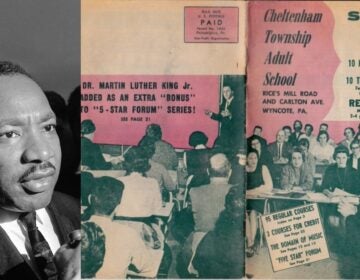From prison, Meek Mill vows to champion changes in Pa. criminal justice system
Penn hosts discussion of Philadelphia rapper's case as emblematic of a system clouded with racial bias.
-
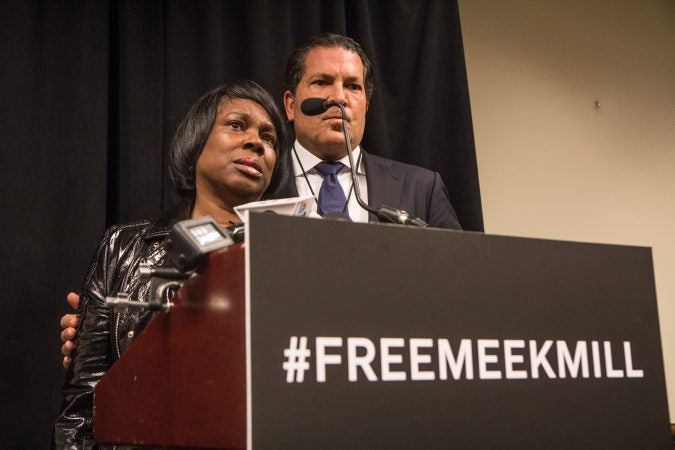
Meek Mill’s mother Kathy Williams and his attorney Joe Tacopina take questions at a press conference Tuesday afternoon. (Kimberly Paynter/WHYY)
-
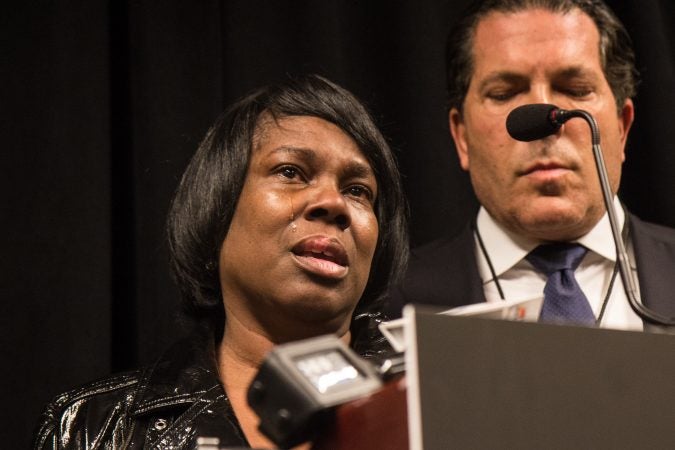
Meek Mill’s mother Kathy Williams and his attorney Joe Tacopina take questions at a press conference Tuesday afternoon. (Kimberly Paynter/WHYY)
-
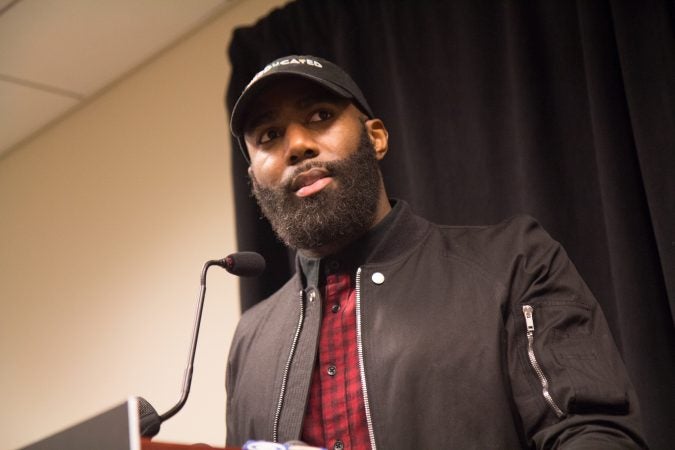
Eagles safety Malcolm Jenkins talks about how Meek Mill’s music inspired the team during playoffs. (Kimberly Paynter/WHYY)
-

Boxer Bernard Hopkins talks about his time incarcerated at a justice reform press conference. (Kimberly Paynter/WHYY)
-
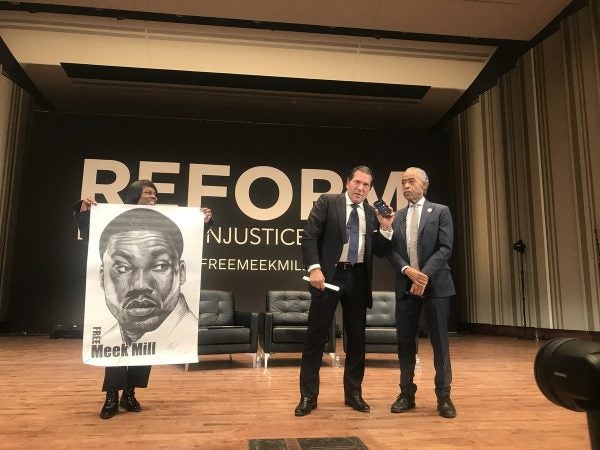
Meek Mill on speakerphone (Bobby Allyn/WHYY)
In a phone call from a state prison in Chester, Philadelphia rap star Meek Mill said he can be a catalyst for criminal justice changes across Pennsylvania.
“I think it’s about time Pennsylvania had some light shined on the system,” Mill, 30, told an audience gathered Tuesday at the University of Pennsylvania. “God picked me to be the one to bring the light to Philadelphia, Pennsylvania, to the world, and I accept it, and I’m going to stand up to it.”
Mill, who has been behind bars since November for probation violations from a decade-old case, has not spoken publicly since Philadelphia Common Pleas Judge Genece Brinkley sentenced him to two to four years.
Mill, whose legal name is Robert Williams, has an April 16 hearing on his confinement scheduled before Brinkley, whom Mill’s lawyers have accused of misconduct.
“When I was 18, I was caught up in the system, and I got out of that situation,” Mill said by phone. “A few mistakes put me below zero. They’re taking me from so high and bringing me back down and putting me in a state penitentiary.”
On Tuesday, a group of activists, university professors, lawyers, members of Mill’s family, and boldface names including the Rev. Al Sharpton and lawyer and activist Bryan Stevenson assembled at Penn to use Mill’s case as a springboard to discuss systematic defects that have long plagued the criminal justice system.
Before Mill got on the phone, his mother, Kathy Williams, told reporters that she hopes Philadelphia District Attorney Larry Krasner intervenes in her son’s case.
“I’m begging the DA Krasner, can he please help me out, help a lot of other people,” said a visibly emotional Williams. “This is a battle it seems like I can’t get over. Can you please, Krasner, look into everything and help me and my son?”
New York defense lawyer Joe Tacopina, who is representing Mill, said 10 years of state supervision for an old drug and gun case is not unusual in Philadelphia. Countless others experience excessive probation after serving time, he said. And if they have a small goof up, they can wind up back in jail.
“How can you be on probation for a decade for a crime you committed when you were a teenager that you did the time for?” Tacopina said. “That’s not the purpose of probation. It’s not punitive. It’s supposed to be a rehabilitation process.”
‘He really wants to make change’
During one of the roundtable discussions, Sharpton called Brinkley’s sentence a “disgrace.”
“This is larger than Meek,” Sharpton said. “If you’re a mobster in Philly, you get a good lawyer and go home. If you violate probation, you get thrown in jail for two to four.”
Stevenson, the director of the Equal Justice Initiative, said Mill’s case is an opportunity to challenge a much deeper history that he said has informed a criminal justice system replete with unequal outcomes.
“There would not be people like Meek Mill in prisons if we weren’t burdened by the history of racial inequality,” said Stevenson. “Racial difference is like smog in the air. It covers everything.”
Nasheema Williams, 34, Mill’s sister, listened to the speakers surrounded by other members of the rapper’s family in the audience. After the event, she questioned the logic of using incarceration as a way of changing behavior.
“Because I think a lot of people go back to jail because they need rehab. And I’m not talking about drug-related situations. I’m saying rehab with shoplifting, rehab with whatever they’re out there doing, they might need help,” said Williams, who lives in Marlton, New Jersey.“It’s not putting them in a cell and thinking they’re going to get help by being in a small cell.”
Williams said the time her brother has served so far has been eye-opening for him.
“He’s in there with a lot of other people who shouldn’t be in there, as well,” she said. “We talk every day and talk about a lot of things that are going on in jail and the people he’s meeting. He really wants to make change when he gets out.”
Two years before sentencing Mill to prison, Brinkley harshly criticized Mill in open court for not following his probation rules.
The violations included failing to report all of his out-of-town travel to his probation officer and submitting a fake urine sample for a drug test.
When Mill found himself back in Brinkley’s court, she said she’d had enough and revoked his probation. Sheriff’s deputies handcuffed him and he was taken away.
The November violation hearing was in part over two separate arrests — one for Mill’s involvement in a St. Louis airport scuffle and another for popping a wheelie while shooting a music video in New York City — but charges from both episodes have either been dropped or are on the way to being dismissed.
Over the last four months, celebrity backers of Mill — including Jay-Z, T.I., and Kevin Hart — have written high-profile op-eds, addressed supporters at rallies, and taken to social media to highlight what they see as an unjust sentence emblematic of systemic inequities.
Billboards with #FreeMeekMill messages were put up in Philadelphia; tour buses traveled around the city with “Stand with Meek Mill” featured prominently on both sides; and Mill’s team hired private investigators to dig up information on Brinkley and peddle it to journalists.
On Tuesday, Tacopina said he is confident Mill will soon gain his freedom from the 8-by-9 cell where he now resides.
“It’s been a perversion from Day One,” Tacopina said. “Meek will come home.”
WHYY is your source for fact-based, in-depth journalism and information. As a nonprofit organization, we rely on financial support from readers like you. Please give today.


